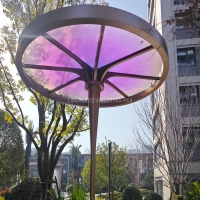Welcome to the website for landscape facilities products and knowledge.
What are the effects of salt crystallization on stone pots?
Salt crystallization is a natural process that can significantly impact stone pots, often leading to long-term damage. When saltwater evaporates inside porous stoneware, salt crystals form within the tiny pores. Over time, these crystals expand, creating internal pressure that weakens the stone's structure. This repeated cycle of crystallization and dissolution can cause cracks, flaking, or even complete breakage.
Stone pots, especially those used for cooking or storage, are particularly vulnerable because they frequently encounter moisture and salt. Unsealed or low-quality stoneware is at higher risk, as their porous nature allows deeper salt penetration. The damage isn’t always immediate; it accumulates over months or years, making prevention crucial.
To mitigate these effects, regularly clean stone pots with fresh water and avoid prolonged exposure to salty liquids. Sealing the stone with food-safe mineral oil can also reduce porosity, limiting salt infiltration. Understanding this process helps preserve stone pots, ensuring their longevity in kitchens and beyond.
By recognizing the signs of salt crystallization early—such as white residue or surface roughness—you can take proactive steps to protect your stoneware. Proper care and maintenance are key to enjoying these durable yet delicate kitchen essentials for years.
Related search:

Recommendation
Metal frame with gradient color acrylic combined with high-end shading landscape facilities